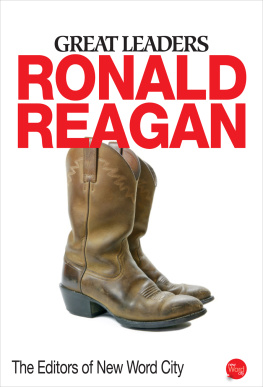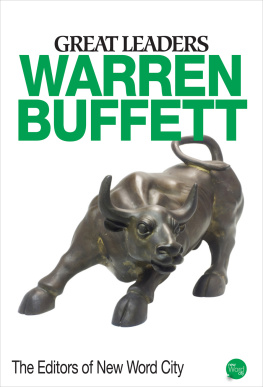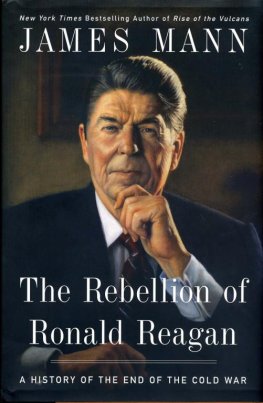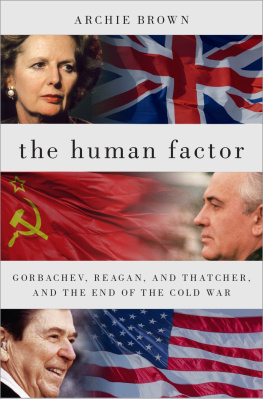Ronald Wilson Reagan knew America. He came into office in 1980 - when the national mood was glum and the future dim - and he lifted the countrys spirits on a wave of hope, purpose, and patriotism. In the years that followed, productivity and prosperity increased at home, the Berlin Wall came down, and the Soviet Union collapsed, making the United States the de facto winner of the Cold War. Reagans policies played a role, of course, but it wasnt just his politics that captured the peoples hearts. He brought something intangible to the national stage, a sunny optimism, an innate can-do spirit that just made Americans feel better.
The former actors handsome, weathered face, his wry smile, quick wit, and effortless manner all worked to make his audiences feel as if they were being taken into his confidence. Dubbed The Great Communicator, Reagan didnt rely solely on his likeability and worked hard at being an effective leader. Like few presidents before him, he understood the power of symbolism, stagecraft, and the cutting, eloquent, or mournful sound bite. Here was a man who was able to unite Americans behind his agenda and restore the countrys greatness.
Awed By FDR
Ronald Reagan was born on February 6, 1911, in an apartment above a small bank in Tampico, a`. He looks like a fat little Dutchman, his twenty-nine-year-old father, John Edward Reagan, quipped of his second son, and the nickname Dutch would stay with him throughout his life.
At the height of the great potato famine, the Reagan family had immigrated to the United States from Ireland after a brief period in England. Jack Reagan was Irish-Catholic, outgoing, ambitious, charming, and a gifted storyteller. He was also poorly educated and, as his son finally learned, a heavy drinker. At the time of the future presidents birth, Reagan worked as a clerk in the H.C. Pitney General Store. His goal was to have his own shoe store.
Ronald Reagans mother, Nelle Wilson Reagan, was a devout Scotch-Irish Protestant, who enjoyed acting in amateur theater productions. She and Jack Reagan had married in 1904. While my father had dreams of making something of himself, Reagan would later write, she had a drive to help my brother and me make something of ourselves.
In 1913, the family moved to Chicago, where Jack got a job selling shoes at the Marshall Fields department store. They lived in a small apartment near the University of Chicago. To turn on the lights, they had to drop a quarter into a slot in the hallway.
Money was scarce, but Reagan later said he felt no sense of deprivation. The future president would remember his childhood as a rare Huck Finn idyll, although that wasnt the whole truth. Nelle took in sewing to supplement her husbands earnings and struggled to keep the family fed. Their primary meal, served at lunch, often consisted of what she called oatmeal meat - browned ground beef mixed with cooked oats and smothered in gravy.
After less than two years in Chicago, the family moved again, this time to rural Galesburg, about 140 miles west, where Jack took a job at another department store, O.T. Johnsons. In Galesburg, Ronald Reagan began to feel the tension between his parents. His father sometimes disappeared for days.
In 1920, after a series of other jobs in a number of small Illinois towns, Jack Reagan and his family landed in Dixon, about a hundred miles west of Chicago. There, Jack, with the help of his former employer, H.C. Pitney, became part owner of a shoe store, the Fashion Boot Shop.
In Dixon, Reagan learned to love the outdoors. The city straddles the Rock River, and Reagan explored the surrounding hills and cliffs and swam in and ice-skated on the river. Having moved so much, he was something of a loner. I think this reluctance to get close to people never left me completely, he once said. Ive never had trouble making friends, but Ive been inclined to hold back a little of myself, reserving it for myself.
Reagan read books about Tarzan and the Rover Boys, books about college life, and books about football and football rivalries. He helped out in the shoe store from time to time but didnt enjoy it. He had ambitious plans for himself:... I began to dream of myself on a college campus, wearing a college jersey, even as a star on the football team. My childhood dream was to become like those guys in the books.
Not judging others by race was something Jack and Nelle instilled in their children. They encouraged their sons to have African-American friends, even though in Dixons movie theater blacks and whites sat apart. Jack Reagan had grown up at a time when signs could be seen on storefronts declaring, No Dogs or Irishmen Allowed. He had experienced discrimination, and he hadnt liked it.
Once, on a business trip, a hotel clerk had said to Jack Reagan: Youll like it here, Mr. Reagan, we dont permit a Jew in the place.
Reagan was appalled and picked up his bags and stormed out. Im a Catholic, he said. If its come to the point where you wont take Jews, then some day you wont want me either. With no other hotels in town, Jack spent the snowy night in his car.
Dutch Reagan was popular in school, having learned at an early age that his charm and smile disarmed teachers and young ladies alike. He wasnt particularly interested in academics, but his sharp memory helped him. Sports and acting in school plays were what he cared about.
In Dixon, Reagan finally learned of his fathers alcoholism. Nelle sat down the two boys and said,... we shouldnt love him less because of it because it was something he couldnt control. If he ever embarrassed us, she said, we should remember how kind and loving he was when he wasnt affected by drink.
A freshman in high school, Reagan tried out for the football team and failed, largely because of his size - he stood just five-feet-three inches and weighed only 108 pounds. He tried out again during his sophomore year but failed then, too. To build up his muscles (and his bank account), he took a job at thirty-five cents an hour with a construction crew. He helped lay floors and tile roofs and smooth wet cement.
When he returned to school, he discovered a football squad for players weighing less than 135 pounds. Reagan was a tackle at first, then a guard. As a junior - and now five-feet-ten-and-a-half inches and 160 pounds - he made the varsity team and played guard. As a senior, he started every game.
After his sophomore year, for seven summers, seven days a week, he worked as a lifeguard at the small lake in Dixons James Russell Lowell Park, earning $15 a week at the beginning, later boosted to $20. Much of it he saved to help pay his college tuition. According to his biographer Lou Cannon, Reagan claimed to have saved seventy-seven people in seven years of summer lifeguarding. He said he kept the count by cutting a notch in a log for each life he saved. He also said the first time he ever got paid for anything was when an elderly swimmer gave him $10 for diving in and retrieving the mans false teeth.
High school saw Reagan blossom into the man so many Americans would come to admire. He now stood six-feet-one and weighed 175 pounds. I began to lose my old feelings of insecurity; success in school plays, in football and swimming, being the only guy on the beach with LIFE GUARD on my chest and saving seventy-seven people, being elected student body president... did a lot to give me self-confidence.
Reagan also grew more determined. At the time, only 7 percent of high school graduates in the United States attended college, and Reagan intended to be one of them. He also aimed to win the heart of auburn-haired Margaret Cleaver: I was sure she was going to be my wife. I was very much in love.
In 1928, Reagan and Margaret Cleaver both enrolled at Eureka College, a small (250 students), Christian, liberal-arts school near Peoria, Illinois, southeast of Dixon, that was the alma mater of a football player he admired. He was given a scholarship that paid half his tuition and a job that earned him enough to cover his meals; his savings took care of the rest.
Next page













